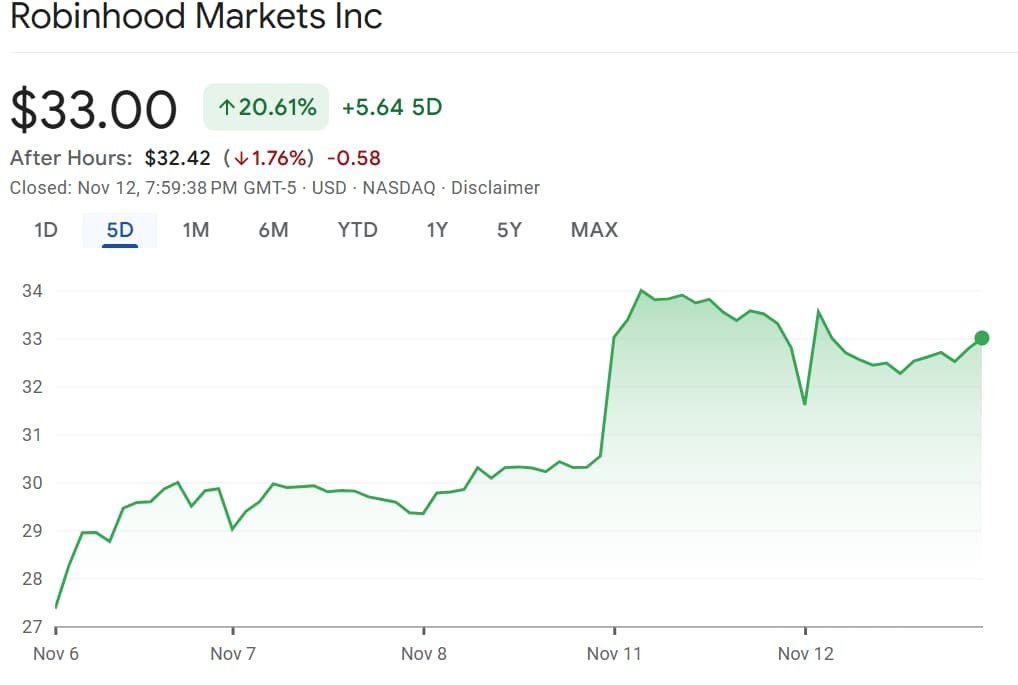Malka Meyer, a director at Robinhood Markets, Inc. (NASDAQ: HOOD), recently sold a substantial portion of his holdings, as disclosed in a filing with the U.S. Securities and Exchange Commission (SEC).
On November 6, 2024, Meyer offloaded a total of 321,218 shares of Robinhood’s Class A Common Stock at an average price of $30.0054, generating approximately $9.64 million in proceeds.
The following day, on November 7, he sold an additional 105,875 shares at an average price of $30.0031, bringing in around $3.18 million.
The largest transaction occurred on November 8, when Meyer sold 2,791,306 shares at an average price of $30.0046, amounting to approximately $83.86 million. Together, these transactions totaled roughly $97.24 million.
Despite the significant sales, Meyer retains substantial indirect ownership in Robinhood through various entities affiliated with Ribbit Capital, totaling 26,138,937 shares.
Market reaction to insider sales
While insider selling may raise concerns among investors, it’s essential to note that these transactions were conducted under a Rule 10b5-1 trading plan, a pre-arranged trading plan.
Therefore, they do not necessarily signal waning confidence in the company but are often part of routine financial planning by executives.
The timing of these sales also aligns with a surge in investor interest in cryptocurrency and fintech stocks, spurred by Donald Trump’s recent presidential election victory.
Trump’s anticipated support for cryptocurrencies has fueled optimism in the digital asset sector, driving Bitcoin to all-time highs and boosting other cryptocurrencies, which has, in turn, positively impacted crypto-exposed stocks like Robinhood.
Strong growth in cryptocurrency revenues
Amid these developments, Robinhood’s stock has experienced a notable rally, with shares recently hitting a 52-week high of $33, a 40% gain since early November.
Cryptocurrency trading revenue has become a major growth driver for Robinhood, reaching $268 million in the first three quarters of 2024.
With the Trump administration signaling a crypto-friendly environment, Robinhood is well-positioned to benefit from increased trading activity, drawing in new users interested in diversifying their portfolios with digital assets.
Furthermore, Robinhood is expanding beyond its core brokerage services with strategic acquisitions. Notably, the company acquired Pluto Capital Inc. to enhance its investment tools and offerings.
It also recently announced plans to acquire Bitstamp, a prominent cryptocurrency exchange, which will expand its crypto trading capabilities to include over 85 tradable assets as well as products like staking and lending.
“The acquisition of Bitstamp is a major step in growing our crypto business” – Johann Kerbrat, General Manager of Robinhood Crypto
This acquisition will broaden Robinhood’s reach, enabling the company to attract customers across the EU, UK, U.S., and Asia.
In addition, Robinhood recently launched its trading app in the U.K. and has plans to introduce stock investing for British users.
The company also intends to offer futures trading for Bitcoin and Ether, tapping into the growing interest in crypto derivatives.
Regulatory challenges and future outlook
Robinhood’s expansion into the cryptocurrency market was not without challenges. In September, the company resolved a $3.9 million case with the California Department of Justice concerning issues with cryptocurrency withdrawals dating back to 2018.
Additionally, in May 2024, the SEC issued Robinhood a Wells notice, signaling potential compliance concerns related to its token offerings.
Despite these headwinds, Robinhood’s trading activity and assets under custody (AUC) have continued to grow.
By the end of October, the company’s AUC reached $159.7 billion, reflecting a 5% increase from September 2024 and an impressive 89% year-over-year growth.
Currently, Robinhood’s stock is trading at $33, marking a five-day gain of 22% and bringing year-to-date returns to a notable 166%.

Analysts maintain an optimistic outlook, projecting a supportive macroeconomic environment through at least 2025, with expectations of positive equity market returns driven by fiscal stimulus and potentially reduced regulatory pressure.
As Robinhood capitalizes on its strong crypto revenue growth and international expansion, it remains under scrutiny for insider trading activities.
Investors should carefully weigh the company’s robust growth potential against regulatory risks, staying alert to its market performance and strategic moves.
Featured image via Shutterstock
Read the full article here
